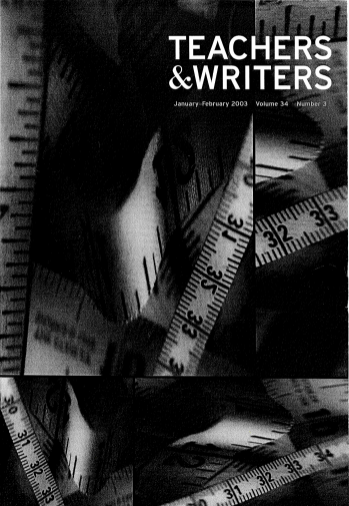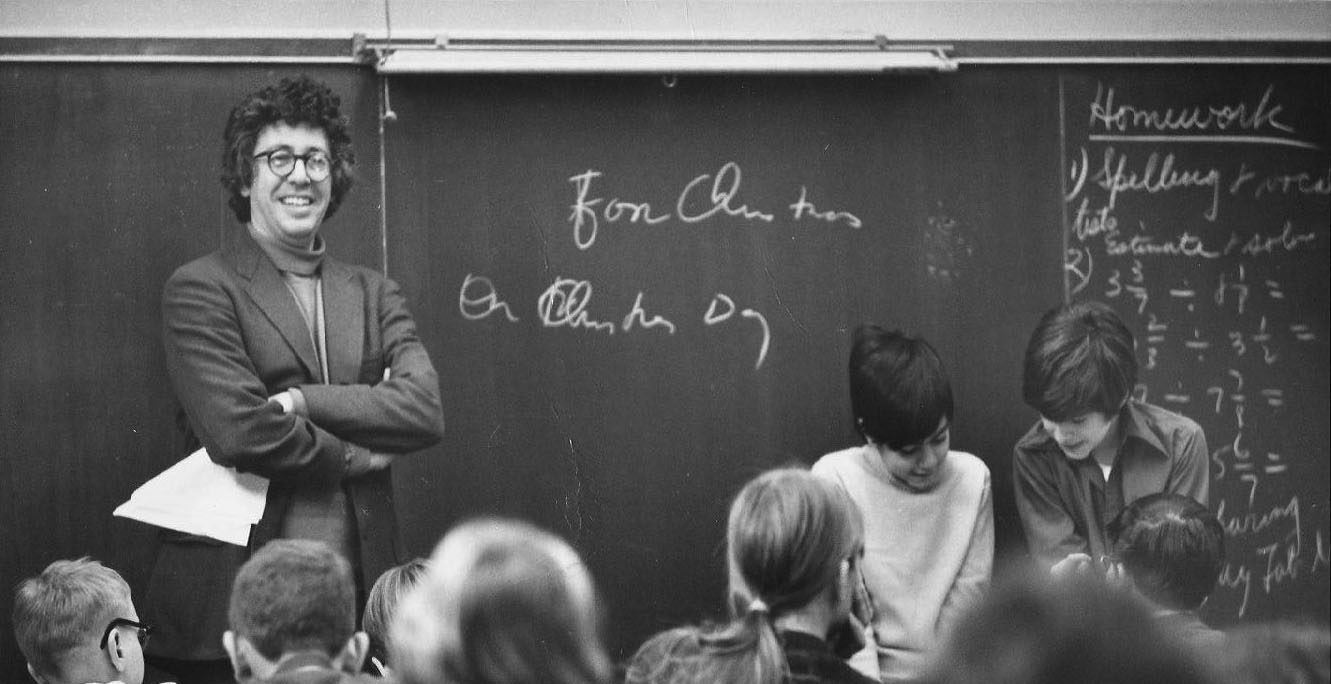FROM THE ARCHIVES: This article previously appeared in Teachers & Writers Magazine, Volume 34, Issue Number 3, Jan-Feb 2003.
Matthew Sharpe: In the excerpt above, you describe a man’s career in journalism in entomological terms, and throughout John Henry Days you use lots of different forms of speech: the montage of letters at the beginning, a post office publicity pamphlet, a stamp collector’s newsletter, a magazine puff piece, a newspaper article about a shooting at a public event, “John Henry” song lyrics, passages written in the form of a play. Can you talk about that method of writing a novel?
Colson Whitehead: My first book, The Intuitionist, is very hermetic. Mostly you’re following Lila Mae in the deep dark city and there’s a pretty consistent tone. In John Henry I wanted to have a lot more voices. Each new character or situation would dictate the way I’d have to tell it. So when, say, the two post office workers are chatting in a bar, I didn’t want to say, “He put his arm down on the bar and picked up a beer.” I wanted to get this kind of Abbott-and-Costello back-and-forth. So it seemed the best way to do that was as a play. It reminds me of being a journalist. Writing for The Village Voice and different magazines, you have to figure out what the style is for each editor and each section of each magazine. Each situation and character demands a certain kind of voice, and special care, so when I started each chapter, I tried to figure out what that special care was.
MS: So technique is motivated by content.
CW: Yeah, you know, form/function.
MS: Sometimes I feel the characters being shoved aside by all the different discourses. You’ve got this character Lucien, an über-publicist, who says, “…air is an admixture of nitrogen, oxygen, trace gases, and one of these traces gases is American cliché and we breathe it in with our first breath.” So I felt the various jargons of the book constituted one of the metaphorical machines that, say, J. Sutter, the protagonist, a pop journalist, is fighting against. Does anybody ever win against that machine?
CW: I think J. Sutter starts off as a pretty disreputable character, and part of what I was trying to do in the middle of the book is to make the reader care about him more and become invested in whether he can pull out of the cycle of press junkets he’s in. So I think the point of the ending—which I end up talking a lot about, because people want to know, Does he leave or not leave, does he get killed or start a new life?—is that I leave it up to you the reader to decide. And I have one response as the writer, who has piled grief upon misfortune upon horrible event on these characters for 300 pages. But then as a reader and an optimistic person, I have my own interpretation that’s separate from that of the person who’s written the book, and when I put that hat on, I feel hopeful about J. But I have these contradictory impulses, the readerly one and the writerly one: how you feel about characters vs. what you have the characters do.
MS: What’s the difference?
CW: You want characters to live and breathe, but you are actually making them do things. They don’t have free will. They are serving a function, to put it very baldly.
You start with a very simple idea, and the more you think about it, the more changes you can ring on it. And the accidental choice you make–like, say, elevators—can turn out to be a rich metaphor: something that elevates, uplifts the race.
MS: Why is it good to end the novel without our knowing for sure what happens to J.?
CW: That kind of ambiguity is at the heart of the John Henry myth. When I was first thinking of it as something to write about, my interpretation was that it was a triumph for humanity: he beats the steam drill and he dies but, you know, “Good job.”
In the first references to him I came across, he’d been claimed by Socialists as a working-class hero who strikes a blow against the Capitalist machine. But as I began doing more research I found that for some steel workers it was a cautionary tale—he was too proud: “This hammer killed John Henry but it won’t kill me,” they sing. In some versions the fight with the machine is a very small part and he’s more of a swaggering playboy who has a lot of ladies, and his last adventure is with a machine and he dies, but that’s part of a portrait of a larger-than-life rascal. So if I’d ended the book one way, it would have been me, the author, putting my stamp on something that’s too mutable and uncontrollable, and would not have been in keeping with the story. Plus it’s fun to make people work.
MS: Your first novel, The Intuitionist, is a detective novel of sorts. Did you know who’d done it before you started writing?
CW: I knew a lot of it. There’s a twist or two in the middle that I hadn’t thought out. There are many betrayals in the book, and I’m sure some of them weren’t there at the beginning. I did study the structure of a lot of detective movies, and the neo-detective novels of Ellroy and Leonard and Mosley, and when you read these books back to back, the structures become really obvious. You know that in an Elmore Leonard novel, twenty pages from the end, bad guy number two will get killed. So when I was plotting my book I had a certain number of conventional detective novel flourishes or beats, and then a few crept in later when I thought I didn’t have enough, or I wanted to make it even more confusing for people.
MS: The Intuitionist features elevated trains and rotary phones, you even refer to “gathering integration.” On the wall of one character’s office there’s a picture of someone you describe as “the famous reverend, the man who was so loud down South,” and African-Americans are called “coloreds.”
Did you have a particular year in mind?
CW: No year. The twentieth century.
Mixing and matching these different chronological bits forces the reader to wonder what year we are in. If Lila Mae—whom I see as a contemporary of mine, a Civil Rights person—is in this pre-Civil Rights workplace where the old boys’ network is in place, what does that mean? Black people are colored: what does that mean when we also have these super-technological elevators in which people are rushing around? I think there’s an interesting tension when you can’t pin it down and there are these different kinds of inputs that are telling you one thing on one page and another thing on another page.
I think that confusion mimics racial confusion at large in the country. What has changed, what hasn’t changed? Has Civil Rights happened or has it not happened? You can read the newspaper and feel that same confusion.
[DELETED Q& A]
MS: Passing seems to be a big literal and metaphorical phenomenon in The Intuitionist.
CW: In black literature of the late 19th and early 20th centuries, passing was such a cliché and plot device that it seemed fun to put it in there. And in detective stories, everyone’s always passing: passing for good, presenting themselves as good and decent when they’re not. The damsel in distress, the politician, the real estate developer. So it seemed like a detective novel trope. And then as I developed the two schools of elevator inspection, Empiricism and Intuitionism—seeing things on the surface as opposed to what’s beneath—it seemed to work more. It’s always accidental, I think. You start with a very simple idea, and the more you think about it, the more changes you can ring on it. And the accidental choice you make–like, say, elevators—can turn out to be a rich metaphor: something that elevates, uplifts the race.
MS: There’s a black character in the book who’s passing for white and engages in this project that is totally a function of his passing. It’s a big pretense, a joke. And then he actually discovers some truth in the pretense. I’m curious what resonance that has for you.
CW: Well I was at Yale doing a reading, and they were teaching The Intuitionist, and a student asked, “How can a joke become true?” And when I got home I thought my answer should have been “How does an idiot become President?”
MS: That’s not funny [laughs].
Here’s an interesting quote from The Intuitionist about Fulton, who wrote the first book about Intuitionist elevator inspection. “Fulton’s words discovered and altered Lila Mae early in her studies.” Have you ever had an experience like that?
CW: Reading Invisible Man in college. In highbrow black literature, I’d only read certain novels of protest that were very realistic. And then I read Invisible Man, which was totally out there and bugged out. It opens up with the protagonist in a room with a thousand light bulbs. He works in a white paint factory. He lives underground. There’s a satchel with a letter inside that says, “Keep this nigger running.” The book is so strange. I remember thinking, “You can do that? In books?” I felt the same way when I was reading Gravity’s Rainbow. When I was coming to the end I thought, “He’s not going to wrap this up, is he? HE’S NOT GOING TO WRAP THIS UP, IS HE? I can’t believe he did that!” It was a revelation, that you can be unconventional in subject—say, in Invisible Man—and you can be unconventional in structure—say, in Gravity’s Rainbow—and have it all work and be a great piece of art. I was a sophomore in college when I read both of those. Good year for me.
MS: Lila Mae of The Intuitionist is so different from J. Sutter of John Henry Days. What made you switch from one to the other?
CW: Maybe this can become a question about pedagogy. From book to book I want to do something different. If I know it’s going to be hard, that makes me want to do it. Before I wrote The Intuitionist, I wrote a more stereotypical book, pop culture-heavy, taking place in New York in the present. And the cast was very much like me. And when I started The Intuitionist I wanted to do something very different. So: third-person narrator, female character, I haven’t done those two before, can I do them? And when I started John Henry, I already knew I could do a linear, plot-heavy book, so how about a book with a more thematic plot that has a lot more characters than just this one repressed, controlled character. And a lot of different voices: I know I can do Lila Mae, and I know I can do a New York hipster. But can I do a railroad baron, or a PR guru, or a young girl in the 40s on Striver’s Row? So I think the fear keeps you honest. Not knowing if you can do it makes the work better, because you’re always second-guessing yourself, making sure you’re doing the best work that you can, not coasting. I just started teaching fiction this year, and someone gave me three stories, and they’re all in the same tone, and they’re all kind of perfect. But if you know you can do it, why write the fourth story in that style? You have this voice down, so stop doing it. That’s the advice I give to people: this is a really good story, don’t do it again. Figure out what you don’t want to do and do that.
MS: You told me earlier that you were embittered when you were writing The Intuitionist. You were so young. What were you embittered about?
CW: Writing a first novel that no one liked. Twenty-six publishers. My agent dumped me. It’s daunting to know it’s going to take a year and a half, two years, three years before the next book is done, and you’ve got to get back on the horse. I’m always excited to start a new book, and then I’m like, “This is not going to be done for two years. This is a horrible, horrible, horrible business.” I mean obviously it’s very rewarding and I love doing it, and I’m happy when I’m in the work and I have a good day. But not getting support from an institution—you’re not in an MFA program, you write short stories that aren’t getting taken by journals, you’re broke, you know, typical artist complaints—that’s where I was. And it was hard to realize that the only thing that would make it right was to write another one.
MS: You didn’t go to an MFA program.
CW: No. I was writing articles for The Village Voice for five years, and I worked out a lot of bad habits and I had a lot of feedback. When you write a dud article you know it’s a dud. And when you write a good one you get a lot of reinforcement. And I felt I could apply to grad school or I could just write the book. I was a freelancer and was enough of a regular at the Voice that I didn’t have to hustle for work. I had three weeks out of the month to work on my own stuff. So I figured, why go back to school? I hated school. The older I got, the more—well, maybe I can’t say this because this is Teachers & Writers.
MS: Yes you can.
CW: I got to the point of, “Just give me the books, send me the exam, I’ll fill it out and send it back to you.” That’s how I felt at the end of my college years. I think I was kind of done with it.
MS: Did you have any good experiences as a student that have helped you as a writer?
CW: When I went to college I tried to get into the creative writing classes and I was never accepted. I wrote these crappy little stories. And I think the lack of support was actually helpful in that you have to really decide you want to do it, and you do it despite any number of setbacks. And then there are setbacks in the publishing world, and then there’s writing stories that don’t work. And this will be ongoing in the writing life. And when you get used to being disappointed, the recovery time gets shorter, the time you need before you get back to work gets shorter and shorter.



